A Critical Evaluation of the Micro Teach Session Reflection Report
VerifiedAdded on 2023/01/05
|10
|3687
|40
Report
AI Summary
This report presents a critical evaluation of a micro-teaching session, focusing on the application of teaching, learning, and assessment principles in the Further Education sector. The report outlines the lesson plan developed, which centered on adverbs of time, place, and manner, and the use of SMART objectives to guide the session. It discusses the importance of differentiation, formative assessment, and creating a structured learning environment. The report also explores various teaching methodologies, including the Grammar-Translation Method (GTM) and communicative language teaching (CLT), alongside Krashen's Monitor Model for language acquisition. Furthermore, the report reflects on the strengths and areas for improvement in the micro-teaching session, highlighting the significance of student engagement, effective communication, and the integration of language learning theories into practice.
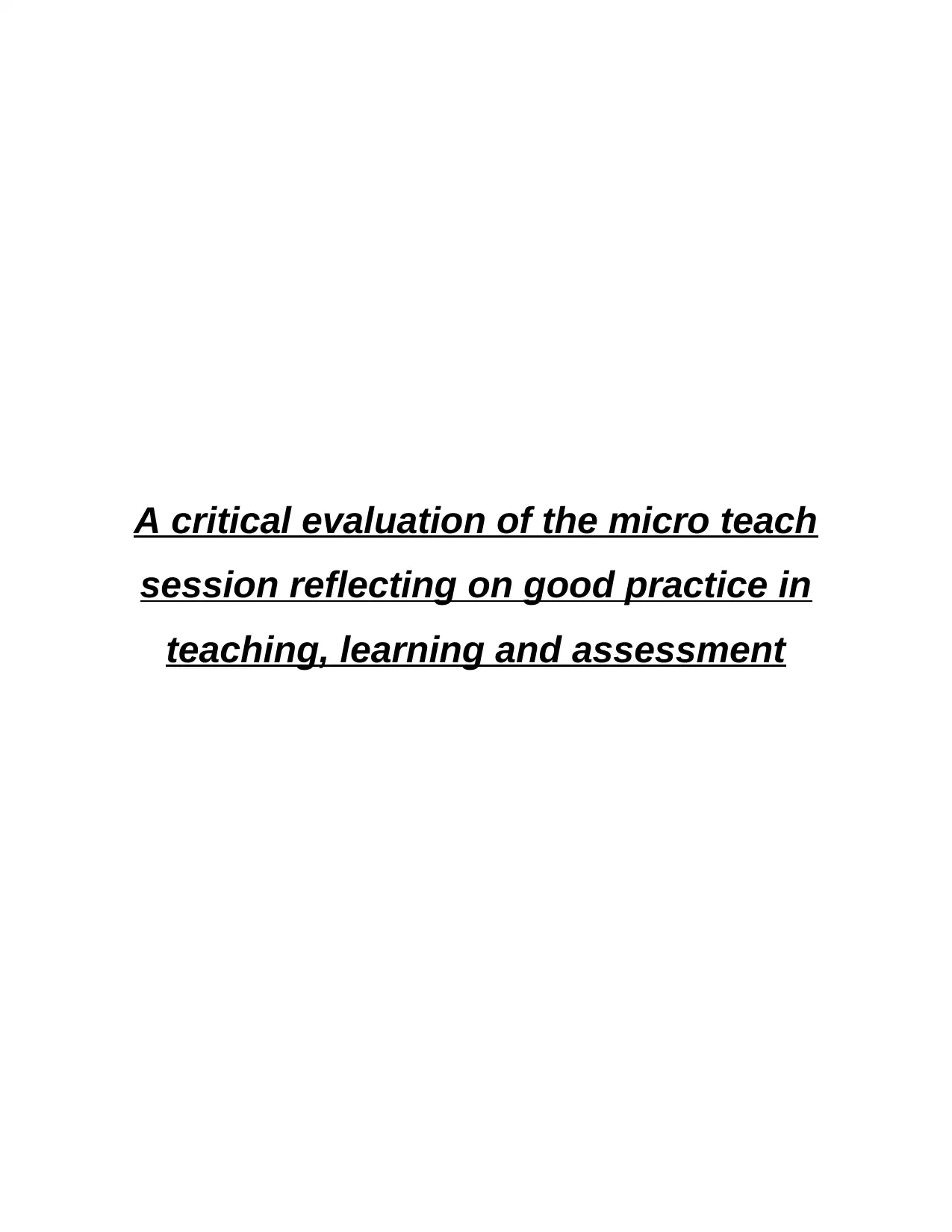
A critical evaluation of the micro teach
session reflecting on good practice in
teaching, learning and assessment
session reflecting on good practice in
teaching, learning and assessment
Paraphrase This Document
Need a fresh take? Get an instant paraphrase of this document with our AI Paraphraser
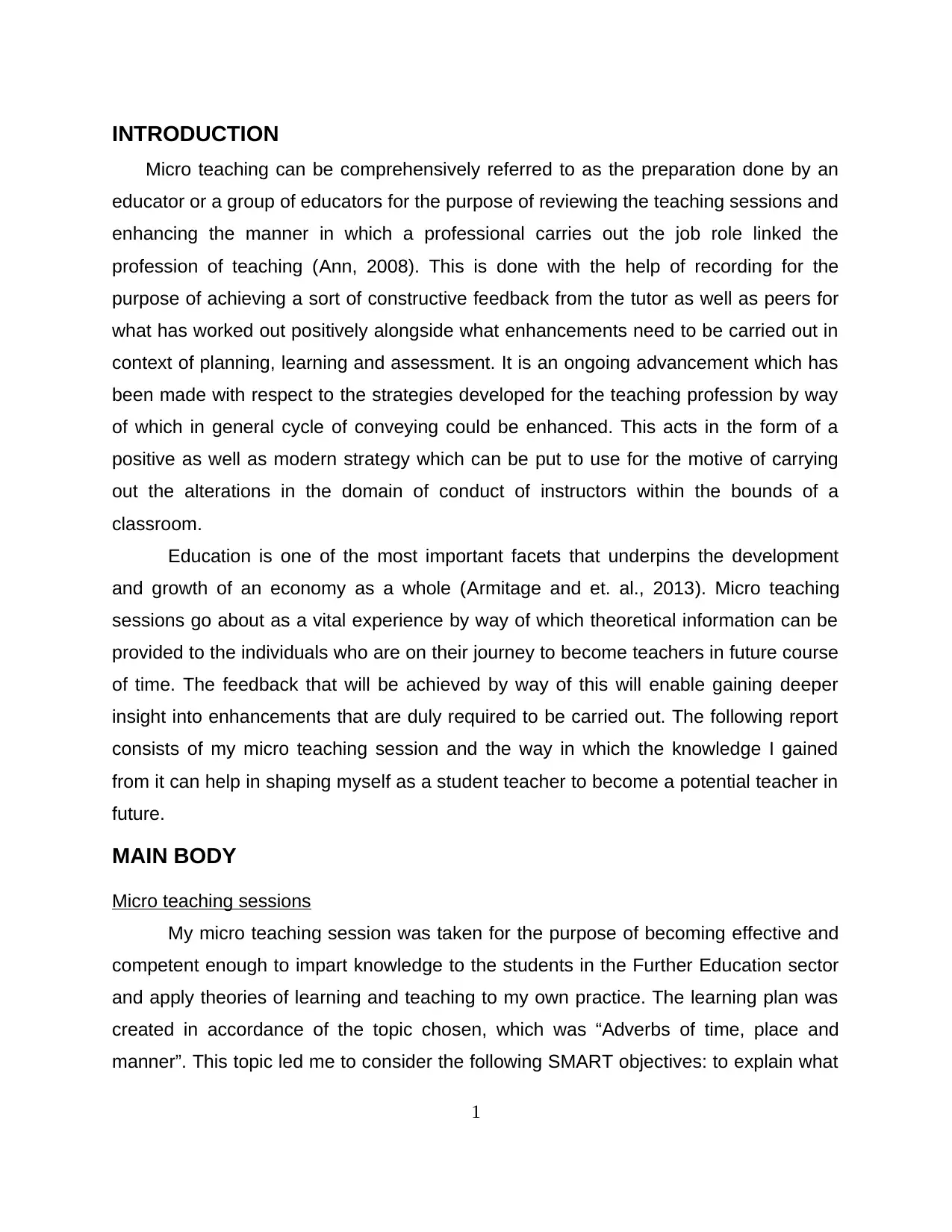
INTRODUCTION
Micro teaching can be comprehensively referred to as the preparation done by an
educator or a group of educators for the purpose of reviewing the teaching sessions and
enhancing the manner in which a professional carries out the job role linked the
profession of teaching (Ann, 2008). This is done with the help of recording for the
purpose of achieving a sort of constructive feedback from the tutor as well as peers for
what has worked out positively alongside what enhancements need to be carried out in
context of planning, learning and assessment. It is an ongoing advancement which has
been made with respect to the strategies developed for the teaching profession by way
of which in general cycle of conveying could be enhanced. This acts in the form of a
positive as well as modern strategy which can be put to use for the motive of carrying
out the alterations in the domain of conduct of instructors within the bounds of a
classroom.
Education is one of the most important facets that underpins the development
and growth of an economy as a whole (Armitage and et. al., 2013). Micro teaching
sessions go about as a vital experience by way of which theoretical information can be
provided to the individuals who are on their journey to become teachers in future course
of time. The feedback that will be achieved by way of this will enable gaining deeper
insight into enhancements that are duly required to be carried out. The following report
consists of my micro teaching session and the way in which the knowledge I gained
from it can help in shaping myself as a student teacher to become a potential teacher in
future.
MAIN BODY
Micro teaching sessions
My micro teaching session was taken for the purpose of becoming effective and
competent enough to impart knowledge to the students in the Further Education sector
and apply theories of learning and teaching to my own practice. The learning plan was
created in accordance of the topic chosen, which was “Adverbs of time, place and
manner”. This topic led me to consider the following SMART objectives: to explain what
1
Micro teaching can be comprehensively referred to as the preparation done by an
educator or a group of educators for the purpose of reviewing the teaching sessions and
enhancing the manner in which a professional carries out the job role linked the
profession of teaching (Ann, 2008). This is done with the help of recording for the
purpose of achieving a sort of constructive feedback from the tutor as well as peers for
what has worked out positively alongside what enhancements need to be carried out in
context of planning, learning and assessment. It is an ongoing advancement which has
been made with respect to the strategies developed for the teaching profession by way
of which in general cycle of conveying could be enhanced. This acts in the form of a
positive as well as modern strategy which can be put to use for the motive of carrying
out the alterations in the domain of conduct of instructors within the bounds of a
classroom.
Education is one of the most important facets that underpins the development
and growth of an economy as a whole (Armitage and et. al., 2013). Micro teaching
sessions go about as a vital experience by way of which theoretical information can be
provided to the individuals who are on their journey to become teachers in future course
of time. The feedback that will be achieved by way of this will enable gaining deeper
insight into enhancements that are duly required to be carried out. The following report
consists of my micro teaching session and the way in which the knowledge I gained
from it can help in shaping myself as a student teacher to become a potential teacher in
future.
MAIN BODY
Micro teaching sessions
My micro teaching session was taken for the purpose of becoming effective and
competent enough to impart knowledge to the students in the Further Education sector
and apply theories of learning and teaching to my own practice. The learning plan was
created in accordance of the topic chosen, which was “Adverbs of time, place and
manner”. This topic led me to consider the following SMART objectives: to explain what
1
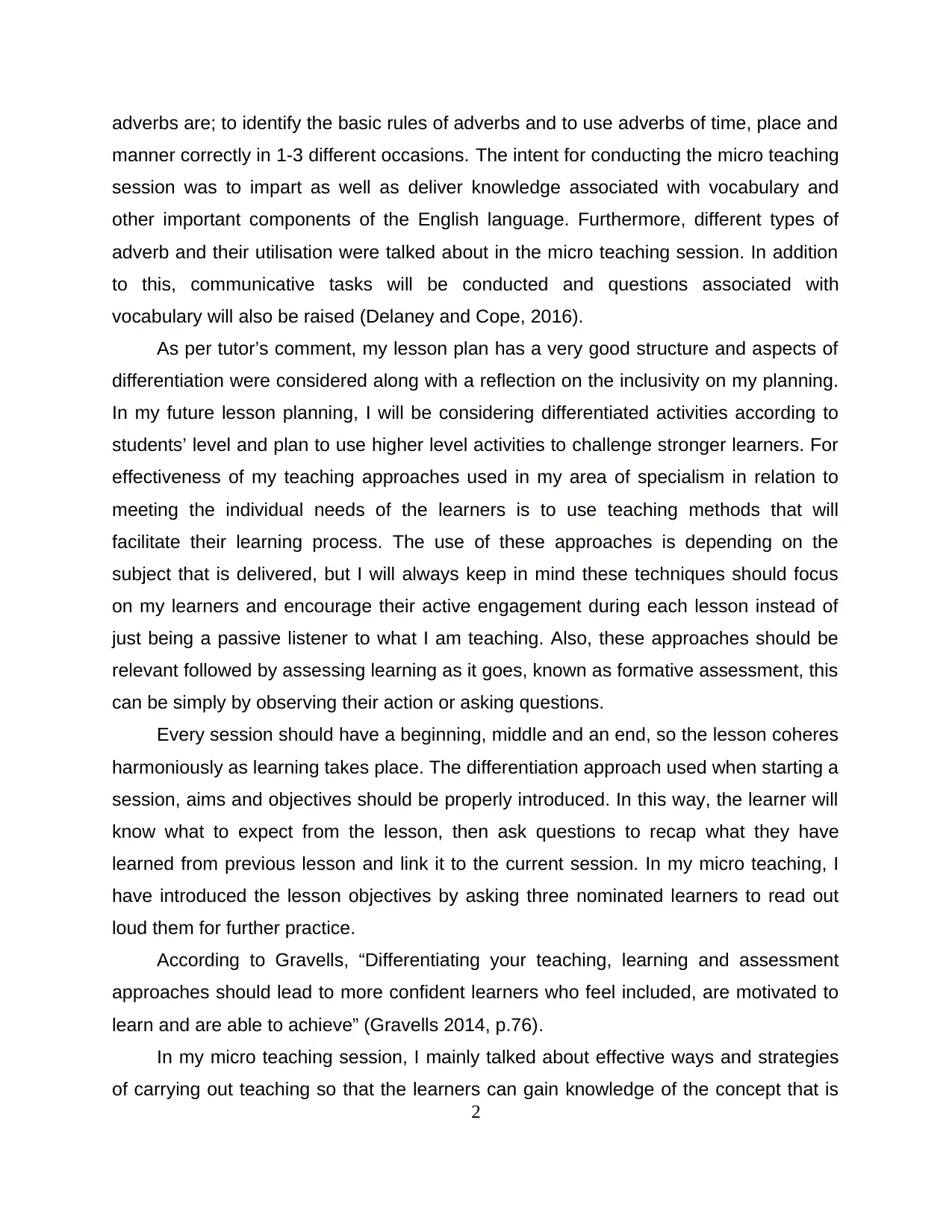
adverbs are; to identify the basic rules of adverbs and to use adverbs of time, place and
manner correctly in 1-3 different occasions. The intent for conducting the micro teaching
session was to impart as well as deliver knowledge associated with vocabulary and
other important components of the English language. Furthermore, different types of
adverb and their utilisation were talked about in the micro teaching session. In addition
to this, communicative tasks will be conducted and questions associated with
vocabulary will also be raised (Delaney and Cope, 2016).
As per tutor’s comment, my lesson plan has a very good structure and aspects of
differentiation were considered along with a reflection on the inclusivity on my planning.
In my future lesson planning, I will be considering differentiated activities according to
students’ level and plan to use higher level activities to challenge stronger learners. For
effectiveness of my teaching approaches used in my area of specialism in relation to
meeting the individual needs of the learners is to use teaching methods that will
facilitate their learning process. The use of these approaches is depending on the
subject that is delivered, but I will always keep in mind these techniques should focus
on my learners and encourage their active engagement during each lesson instead of
just being a passive listener to what I am teaching. Also, these approaches should be
relevant followed by assessing learning as it goes, known as formative assessment, this
can be simply by observing their action or asking questions.
Every session should have a beginning, middle and an end, so the lesson coheres
harmoniously as learning takes place. The differentiation approach used when starting a
session, aims and objectives should be properly introduced. In this way, the learner will
know what to expect from the lesson, then ask questions to recap what they have
learned from previous lesson and link it to the current session. In my micro teaching, I
have introduced the lesson objectives by asking three nominated learners to read out
loud them for further practice.
According to Gravells, “Differentiating your teaching, learning and assessment
approaches should lead to more confident learners who feel included, are motivated to
learn and are able to achieve” (Gravells 2014, p.76).
In my micro teaching session, I mainly talked about effective ways and strategies
of carrying out teaching so that the learners can gain knowledge of the concept that is
2
manner correctly in 1-3 different occasions. The intent for conducting the micro teaching
session was to impart as well as deliver knowledge associated with vocabulary and
other important components of the English language. Furthermore, different types of
adverb and their utilisation were talked about in the micro teaching session. In addition
to this, communicative tasks will be conducted and questions associated with
vocabulary will also be raised (Delaney and Cope, 2016).
As per tutor’s comment, my lesson plan has a very good structure and aspects of
differentiation were considered along with a reflection on the inclusivity on my planning.
In my future lesson planning, I will be considering differentiated activities according to
students’ level and plan to use higher level activities to challenge stronger learners. For
effectiveness of my teaching approaches used in my area of specialism in relation to
meeting the individual needs of the learners is to use teaching methods that will
facilitate their learning process. The use of these approaches is depending on the
subject that is delivered, but I will always keep in mind these techniques should focus
on my learners and encourage their active engagement during each lesson instead of
just being a passive listener to what I am teaching. Also, these approaches should be
relevant followed by assessing learning as it goes, known as formative assessment, this
can be simply by observing their action or asking questions.
Every session should have a beginning, middle and an end, so the lesson coheres
harmoniously as learning takes place. The differentiation approach used when starting a
session, aims and objectives should be properly introduced. In this way, the learner will
know what to expect from the lesson, then ask questions to recap what they have
learned from previous lesson and link it to the current session. In my micro teaching, I
have introduced the lesson objectives by asking three nominated learners to read out
loud them for further practice.
According to Gravells, “Differentiating your teaching, learning and assessment
approaches should lead to more confident learners who feel included, are motivated to
learn and are able to achieve” (Gravells 2014, p.76).
In my micro teaching session, I mainly talked about effective ways and strategies
of carrying out teaching so that the learners can gain knowledge of the concept that is
2
⊘ This is a preview!⊘
Do you want full access?
Subscribe today to unlock all pages.

Trusted by 1+ million students worldwide
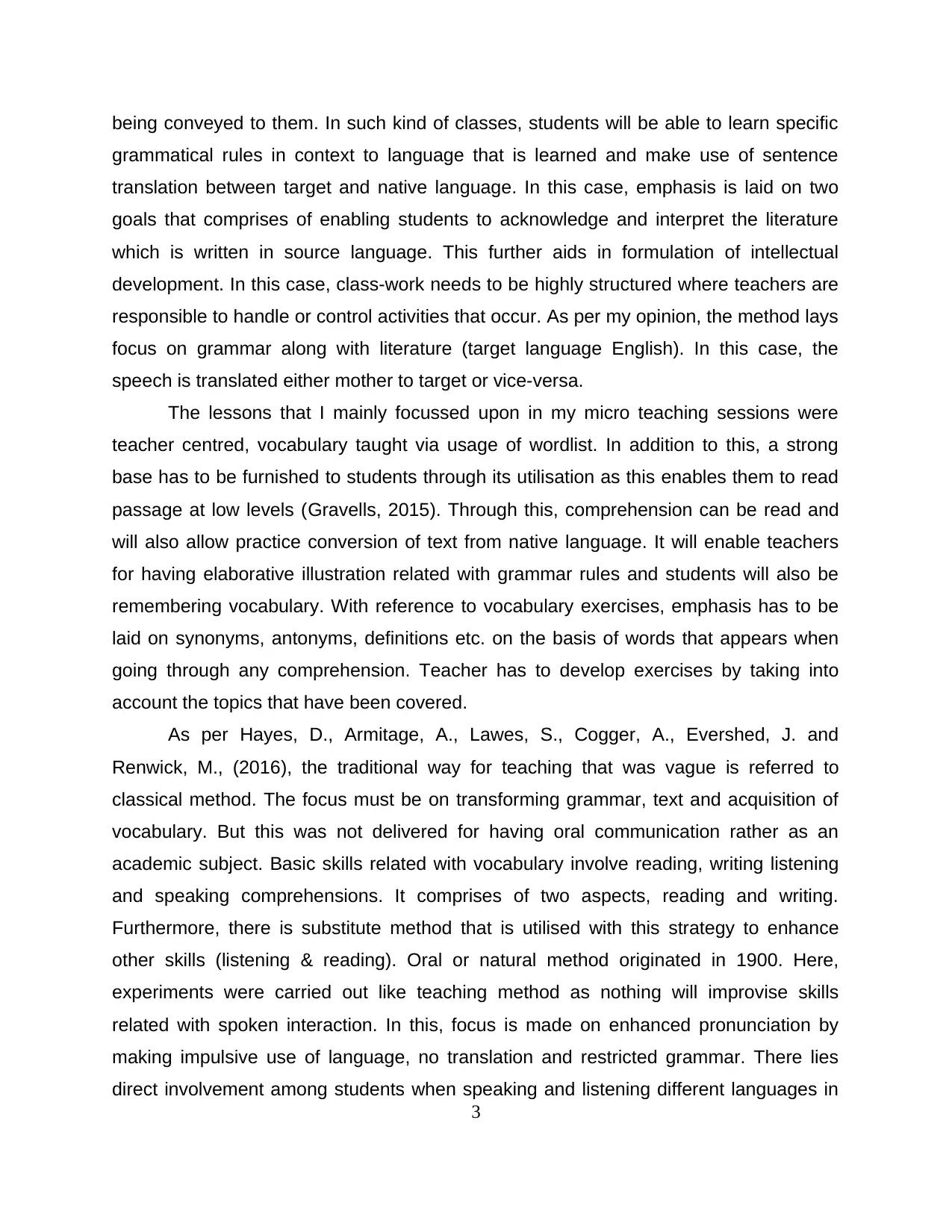
being conveyed to them. In such kind of classes, students will be able to learn specific
grammatical rules in context to language that is learned and make use of sentence
translation between target and native language. In this case, emphasis is laid on two
goals that comprises of enabling students to acknowledge and interpret the literature
which is written in source language. This further aids in formulation of intellectual
development. In this case, class-work needs to be highly structured where teachers are
responsible to handle or control activities that occur. As per my opinion, the method lays
focus on grammar along with literature (target language English). In this case, the
speech is translated either mother to target or vice-versa.
The lessons that I mainly focussed upon in my micro teaching sessions were
teacher centred, vocabulary taught via usage of wordlist. In addition to this, a strong
base has to be furnished to students through its utilisation as this enables them to read
passage at low levels (Gravells, 2015). Through this, comprehension can be read and
will also allow practice conversion of text from native language. It will enable teachers
for having elaborative illustration related with grammar rules and students will also be
remembering vocabulary. With reference to vocabulary exercises, emphasis has to be
laid on synonyms, antonyms, definitions etc. on the basis of words that appears when
going through any comprehension. Teacher has to develop exercises by taking into
account the topics that have been covered.
As per Hayes, D., Armitage, A., Lawes, S., Cogger, A., Evershed, J. and
Renwick, M., (2016), the traditional way for teaching that was vague is referred to
classical method. The focus must be on transforming grammar, text and acquisition of
vocabulary. But this was not delivered for having oral communication rather as an
academic subject. Basic skills related with vocabulary involve reading, writing listening
and speaking comprehensions. It comprises of two aspects, reading and writing.
Furthermore, there is substitute method that is utilised with this strategy to enhance
other skills (listening & reading). Oral or natural method originated in 1900. Here,
experiments were carried out like teaching method as nothing will improvise skills
related with spoken interaction. In this, focus is made on enhanced pronunciation by
making impulsive use of language, no translation and restricted grammar. There lies
direct involvement among students when speaking and listening different languages in
3
grammatical rules in context to language that is learned and make use of sentence
translation between target and native language. In this case, emphasis is laid on two
goals that comprises of enabling students to acknowledge and interpret the literature
which is written in source language. This further aids in formulation of intellectual
development. In this case, class-work needs to be highly structured where teachers are
responsible to handle or control activities that occur. As per my opinion, the method lays
focus on grammar along with literature (target language English). In this case, the
speech is translated either mother to target or vice-versa.
The lessons that I mainly focussed upon in my micro teaching sessions were
teacher centred, vocabulary taught via usage of wordlist. In addition to this, a strong
base has to be furnished to students through its utilisation as this enables them to read
passage at low levels (Gravells, 2015). Through this, comprehension can be read and
will also allow practice conversion of text from native language. It will enable teachers
for having elaborative illustration related with grammar rules and students will also be
remembering vocabulary. With reference to vocabulary exercises, emphasis has to be
laid on synonyms, antonyms, definitions etc. on the basis of words that appears when
going through any comprehension. Teacher has to develop exercises by taking into
account the topics that have been covered.
As per Hayes, D., Armitage, A., Lawes, S., Cogger, A., Evershed, J. and
Renwick, M., (2016), the traditional way for teaching that was vague is referred to
classical method. The focus must be on transforming grammar, text and acquisition of
vocabulary. But this was not delivered for having oral communication rather as an
academic subject. Basic skills related with vocabulary involve reading, writing listening
and speaking comprehensions. It comprises of two aspects, reading and writing.
Furthermore, there is substitute method that is utilised with this strategy to enhance
other skills (listening & reading). Oral or natural method originated in 1900. Here,
experiments were carried out like teaching method as nothing will improvise skills
related with spoken interaction. In this, focus is made on enhanced pronunciation by
making impulsive use of language, no translation and restricted grammar. There lies
direct involvement among students when speaking and listening different languages in
3
Paraphrase This Document
Need a fresh take? Get an instant paraphrase of this document with our AI Paraphraser
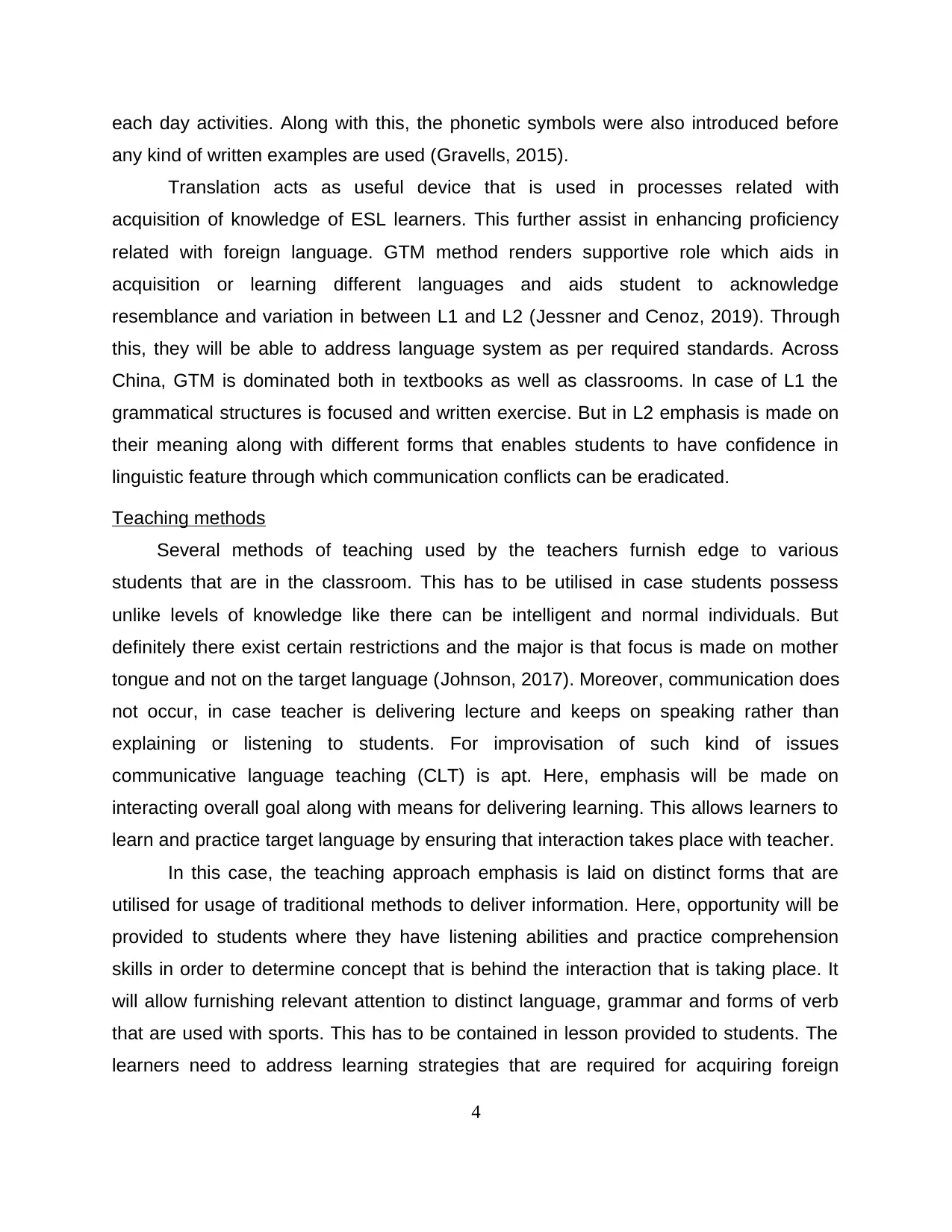
each day activities. Along with this, the phonetic symbols were also introduced before
any kind of written examples are used (Gravells, 2015).
Translation acts as useful device that is used in processes related with
acquisition of knowledge of ESL learners. This further assist in enhancing proficiency
related with foreign language. GTM method renders supportive role which aids in
acquisition or learning different languages and aids student to acknowledge
resemblance and variation in between L1 and L2 (Jessner and Cenoz, 2019). Through
this, they will be able to address language system as per required standards. Across
China, GTM is dominated both in textbooks as well as classrooms. In case of L1 the
grammatical structures is focused and written exercise. But in L2 emphasis is made on
their meaning along with different forms that enables students to have confidence in
linguistic feature through which communication conflicts can be eradicated.
Teaching methods
Several methods of teaching used by the teachers furnish edge to various
students that are in the classroom. This has to be utilised in case students possess
unlike levels of knowledge like there can be intelligent and normal individuals. But
definitely there exist certain restrictions and the major is that focus is made on mother
tongue and not on the target language (Johnson, 2017). Moreover, communication does
not occur, in case teacher is delivering lecture and keeps on speaking rather than
explaining or listening to students. For improvisation of such kind of issues
communicative language teaching (CLT) is apt. Here, emphasis will be made on
interacting overall goal along with means for delivering learning. This allows learners to
learn and practice target language by ensuring that interaction takes place with teacher.
In this case, the teaching approach emphasis is laid on distinct forms that are
utilised for usage of traditional methods to deliver information. Here, opportunity will be
provided to students where they have listening abilities and practice comprehension
skills in order to determine concept that is behind the interaction that is taking place. It
will allow furnishing relevant attention to distinct language, grammar and forms of verb
that are used with sports. This has to be contained in lesson provided to students. The
learners need to address learning strategies that are required for acquiring foreign
4
any kind of written examples are used (Gravells, 2015).
Translation acts as useful device that is used in processes related with
acquisition of knowledge of ESL learners. This further assist in enhancing proficiency
related with foreign language. GTM method renders supportive role which aids in
acquisition or learning different languages and aids student to acknowledge
resemblance and variation in between L1 and L2 (Jessner and Cenoz, 2019). Through
this, they will be able to address language system as per required standards. Across
China, GTM is dominated both in textbooks as well as classrooms. In case of L1 the
grammatical structures is focused and written exercise. But in L2 emphasis is made on
their meaning along with different forms that enables students to have confidence in
linguistic feature through which communication conflicts can be eradicated.
Teaching methods
Several methods of teaching used by the teachers furnish edge to various
students that are in the classroom. This has to be utilised in case students possess
unlike levels of knowledge like there can be intelligent and normal individuals. But
definitely there exist certain restrictions and the major is that focus is made on mother
tongue and not on the target language (Johnson, 2017). Moreover, communication does
not occur, in case teacher is delivering lecture and keeps on speaking rather than
explaining or listening to students. For improvisation of such kind of issues
communicative language teaching (CLT) is apt. Here, emphasis will be made on
interacting overall goal along with means for delivering learning. This allows learners to
learn and practice target language by ensuring that interaction takes place with teacher.
In this case, the teaching approach emphasis is laid on distinct forms that are
utilised for usage of traditional methods to deliver information. Here, opportunity will be
provided to students where they have listening abilities and practice comprehension
skills in order to determine concept that is behind the interaction that is taking place. It
will allow furnishing relevant attention to distinct language, grammar and forms of verb
that are used with sports. This has to be contained in lesson provided to students. The
learners need to address learning strategies that are required for acquiring foreign
4
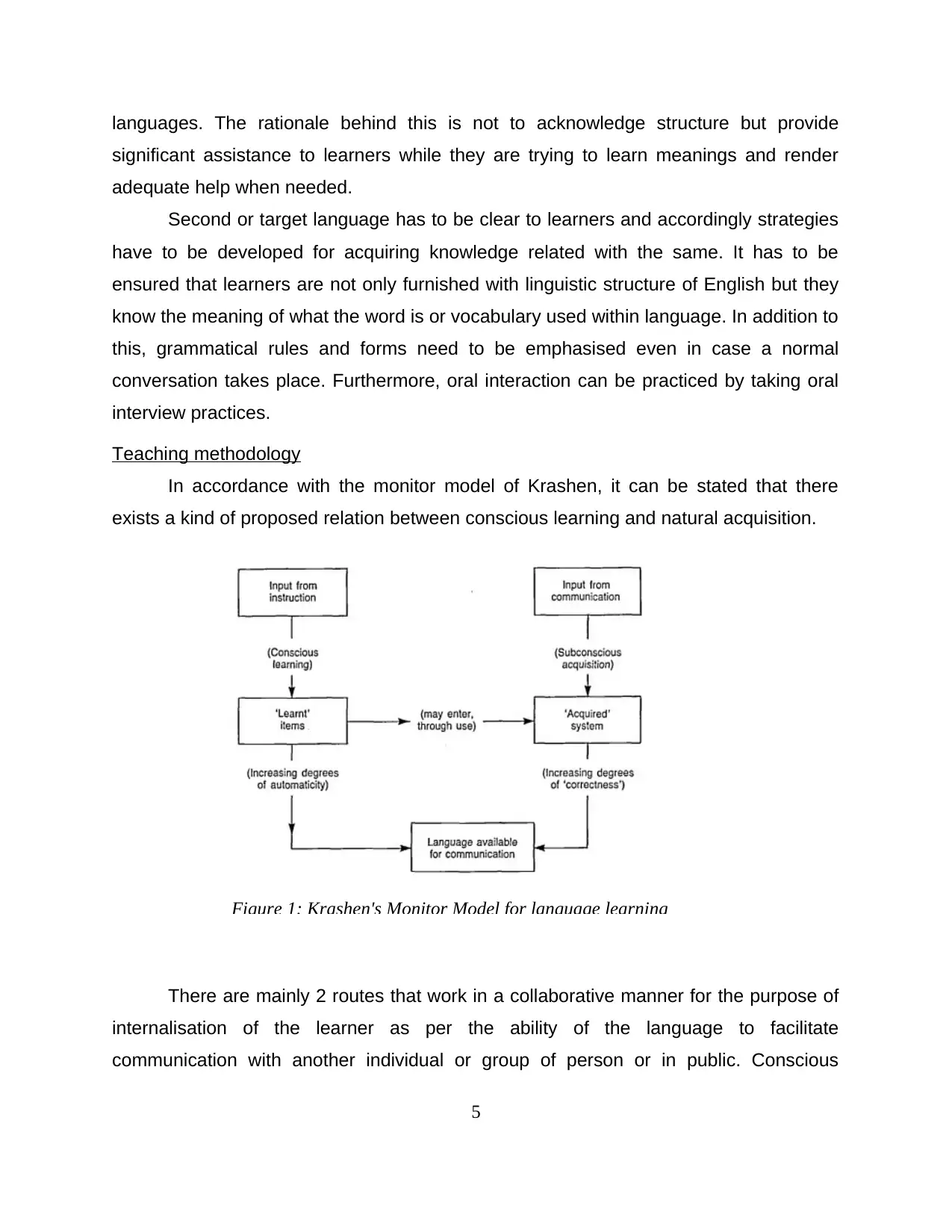
languages. The rationale behind this is not to acknowledge structure but provide
significant assistance to learners while they are trying to learn meanings and render
adequate help when needed.
Second or target language has to be clear to learners and accordingly strategies
have to be developed for acquiring knowledge related with the same. It has to be
ensured that learners are not only furnished with linguistic structure of English but they
know the meaning of what the word is or vocabulary used within language. In addition to
this, grammatical rules and forms need to be emphasised even in case a normal
conversation takes place. Furthermore, oral interaction can be practiced by taking oral
interview practices.
Teaching methodology
In accordance with the monitor model of Krashen, it can be stated that there
exists a kind of proposed relation between conscious learning and natural acquisition.
There are mainly 2 routes that work in a collaborative manner for the purpose of
internalisation of the learner as per the ability of the language to facilitate
communication with another individual or group of person or in public. Conscious
5
Figure 1: Krashen's Monitor Model for language learning
significant assistance to learners while they are trying to learn meanings and render
adequate help when needed.
Second or target language has to be clear to learners and accordingly strategies
have to be developed for acquiring knowledge related with the same. It has to be
ensured that learners are not only furnished with linguistic structure of English but they
know the meaning of what the word is or vocabulary used within language. In addition to
this, grammatical rules and forms need to be emphasised even in case a normal
conversation takes place. Furthermore, oral interaction can be practiced by taking oral
interview practices.
Teaching methodology
In accordance with the monitor model of Krashen, it can be stated that there
exists a kind of proposed relation between conscious learning and natural acquisition.
There are mainly 2 routes that work in a collaborative manner for the purpose of
internalisation of the learner as per the ability of the language to facilitate
communication with another individual or group of person or in public. Conscious
5
Figure 1: Krashen's Monitor Model for language learning
⊘ This is a preview!⊘
Do you want full access?
Subscribe today to unlock all pages.

Trusted by 1+ million students worldwide
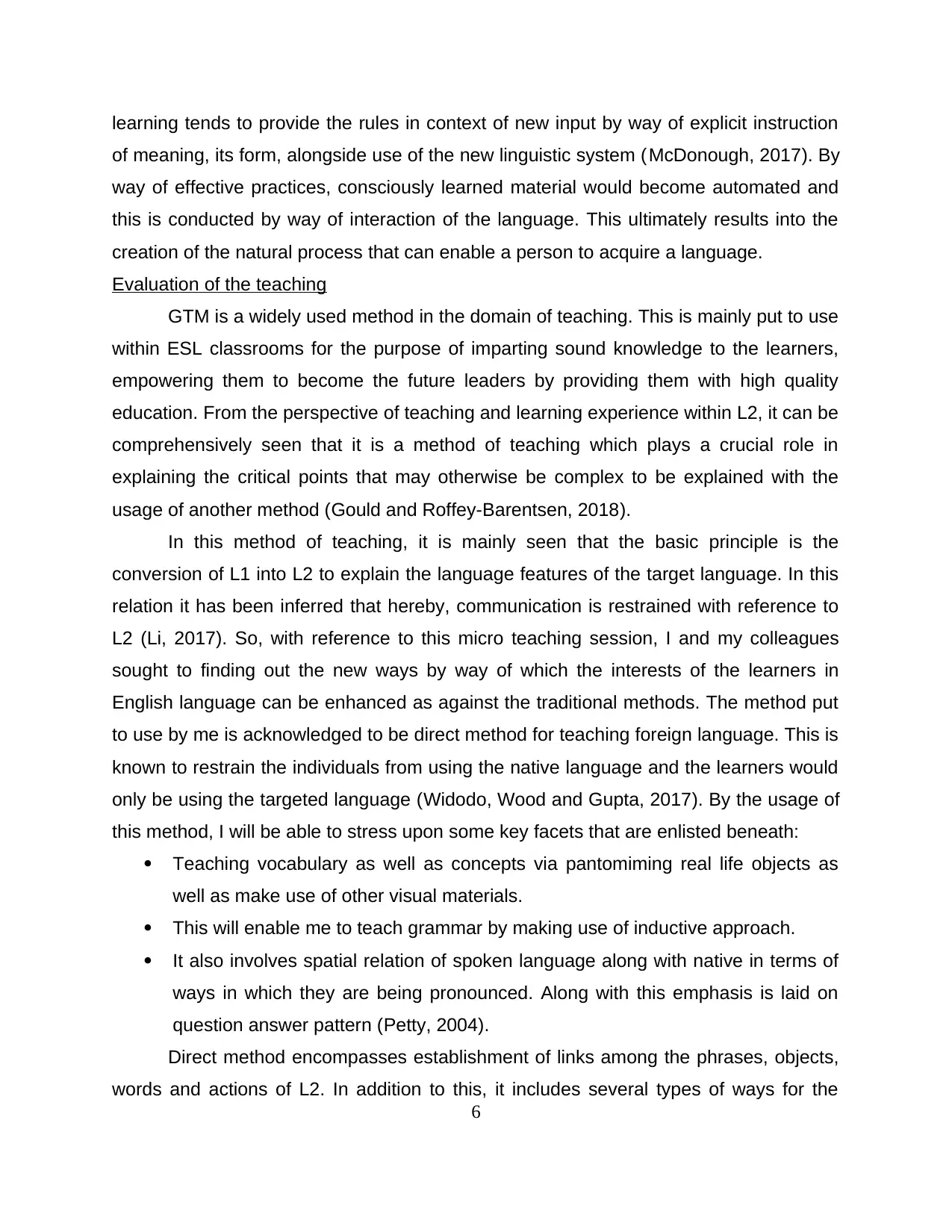
learning tends to provide the rules in context of new input by way of explicit instruction
of meaning, its form, alongside use of the new linguistic system (McDonough, 2017). By
way of effective practices, consciously learned material would become automated and
this is conducted by way of interaction of the language. This ultimately results into the
creation of the natural process that can enable a person to acquire a language.
Evaluation of the teaching
GTM is a widely used method in the domain of teaching. This is mainly put to use
within ESL classrooms for the purpose of imparting sound knowledge to the learners,
empowering them to become the future leaders by providing them with high quality
education. From the perspective of teaching and learning experience within L2, it can be
comprehensively seen that it is a method of teaching which plays a crucial role in
explaining the critical points that may otherwise be complex to be explained with the
usage of another method (Gould and Roffey-Barentsen, 2018).
In this method of teaching, it is mainly seen that the basic principle is the
conversion of L1 into L2 to explain the language features of the target language. In this
relation it has been inferred that hereby, communication is restrained with reference to
L2 (Li, 2017). So, with reference to this micro teaching session, I and my colleagues
sought to finding out the new ways by way of which the interests of the learners in
English language can be enhanced as against the traditional methods. The method put
to use by me is acknowledged to be direct method for teaching foreign language. This is
known to restrain the individuals from using the native language and the learners would
only be using the targeted language (Widodo, Wood and Gupta, 2017). By the usage of
this method, I will be able to stress upon some key facets that are enlisted beneath:
Teaching vocabulary as well as concepts via pantomiming real life objects as
well as make use of other visual materials.
This will enable me to teach grammar by making use of inductive approach.
It also involves spatial relation of spoken language along with native in terms of
ways in which they are being pronounced. Along with this emphasis is laid on
question answer pattern (Petty, 2004).
Direct method encompasses establishment of links among the phrases, objects,
words and actions of L2. In addition to this, it includes several types of ways for the
6
of meaning, its form, alongside use of the new linguistic system (McDonough, 2017). By
way of effective practices, consciously learned material would become automated and
this is conducted by way of interaction of the language. This ultimately results into the
creation of the natural process that can enable a person to acquire a language.
Evaluation of the teaching
GTM is a widely used method in the domain of teaching. This is mainly put to use
within ESL classrooms for the purpose of imparting sound knowledge to the learners,
empowering them to become the future leaders by providing them with high quality
education. From the perspective of teaching and learning experience within L2, it can be
comprehensively seen that it is a method of teaching which plays a crucial role in
explaining the critical points that may otherwise be complex to be explained with the
usage of another method (Gould and Roffey-Barentsen, 2018).
In this method of teaching, it is mainly seen that the basic principle is the
conversion of L1 into L2 to explain the language features of the target language. In this
relation it has been inferred that hereby, communication is restrained with reference to
L2 (Li, 2017). So, with reference to this micro teaching session, I and my colleagues
sought to finding out the new ways by way of which the interests of the learners in
English language can be enhanced as against the traditional methods. The method put
to use by me is acknowledged to be direct method for teaching foreign language. This is
known to restrain the individuals from using the native language and the learners would
only be using the targeted language (Widodo, Wood and Gupta, 2017). By the usage of
this method, I will be able to stress upon some key facets that are enlisted beneath:
Teaching vocabulary as well as concepts via pantomiming real life objects as
well as make use of other visual materials.
This will enable me to teach grammar by making use of inductive approach.
It also involves spatial relation of spoken language along with native in terms of
ways in which they are being pronounced. Along with this emphasis is laid on
question answer pattern (Petty, 2004).
Direct method encompasses establishment of links among the phrases, objects,
words and actions of L2. In addition to this, it includes several types of ways for the
6
Paraphrase This Document
Need a fresh take? Get an instant paraphrase of this document with our AI Paraphraser
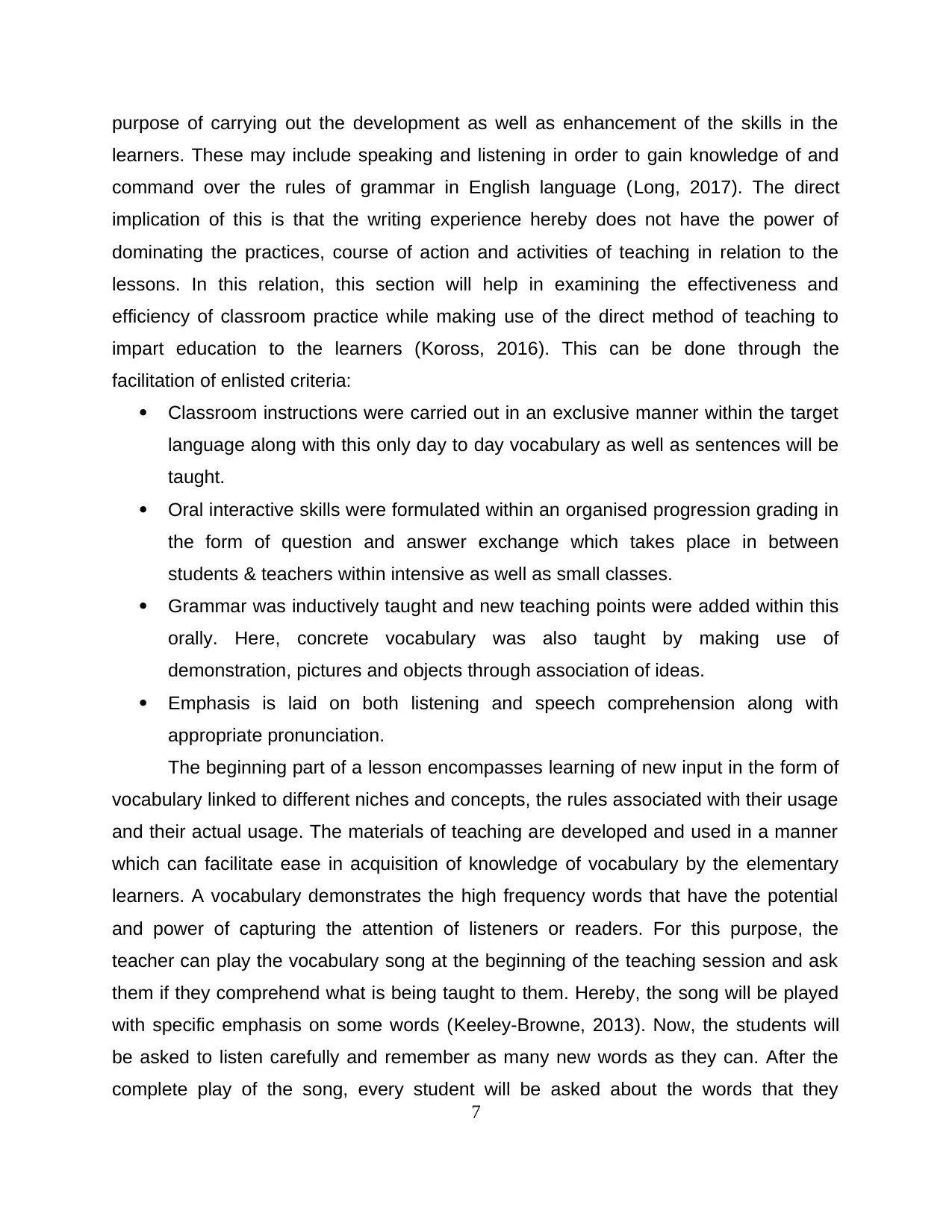
purpose of carrying out the development as well as enhancement of the skills in the
learners. These may include speaking and listening in order to gain knowledge of and
command over the rules of grammar in English language (Long, 2017). The direct
implication of this is that the writing experience hereby does not have the power of
dominating the practices, course of action and activities of teaching in relation to the
lessons. In this relation, this section will help in examining the effectiveness and
efficiency of classroom practice while making use of the direct method of teaching to
impart education to the learners (Koross, 2016). This can be done through the
facilitation of enlisted criteria:
Classroom instructions were carried out in an exclusive manner within the target
language along with this only day to day vocabulary as well as sentences will be
taught.
Oral interactive skills were formulated within an organised progression grading in
the form of question and answer exchange which takes place in between
students & teachers within intensive as well as small classes.
Grammar was inductively taught and new teaching points were added within this
orally. Here, concrete vocabulary was also taught by making use of
demonstration, pictures and objects through association of ideas.
Emphasis is laid on both listening and speech comprehension along with
appropriate pronunciation.
The beginning part of a lesson encompasses learning of new input in the form of
vocabulary linked to different niches and concepts, the rules associated with their usage
and their actual usage. The materials of teaching are developed and used in a manner
which can facilitate ease in acquisition of knowledge of vocabulary by the elementary
learners. A vocabulary demonstrates the high frequency words that have the potential
and power of capturing the attention of listeners or readers. For this purpose, the
teacher can play the vocabulary song at the beginning of the teaching session and ask
them if they comprehend what is being taught to them. Hereby, the song will be played
with specific emphasis on some words (Keeley-Browne, 2013). Now, the students will
be asked to listen carefully and remember as many new words as they can. After the
complete play of the song, every student will be asked about the words that they
7
learners. These may include speaking and listening in order to gain knowledge of and
command over the rules of grammar in English language (Long, 2017). The direct
implication of this is that the writing experience hereby does not have the power of
dominating the practices, course of action and activities of teaching in relation to the
lessons. In this relation, this section will help in examining the effectiveness and
efficiency of classroom practice while making use of the direct method of teaching to
impart education to the learners (Koross, 2016). This can be done through the
facilitation of enlisted criteria:
Classroom instructions were carried out in an exclusive manner within the target
language along with this only day to day vocabulary as well as sentences will be
taught.
Oral interactive skills were formulated within an organised progression grading in
the form of question and answer exchange which takes place in between
students & teachers within intensive as well as small classes.
Grammar was inductively taught and new teaching points were added within this
orally. Here, concrete vocabulary was also taught by making use of
demonstration, pictures and objects through association of ideas.
Emphasis is laid on both listening and speech comprehension along with
appropriate pronunciation.
The beginning part of a lesson encompasses learning of new input in the form of
vocabulary linked to different niches and concepts, the rules associated with their usage
and their actual usage. The materials of teaching are developed and used in a manner
which can facilitate ease in acquisition of knowledge of vocabulary by the elementary
learners. A vocabulary demonstrates the high frequency words that have the potential
and power of capturing the attention of listeners or readers. For this purpose, the
teacher can play the vocabulary song at the beginning of the teaching session and ask
them if they comprehend what is being taught to them. Hereby, the song will be played
with specific emphasis on some words (Keeley-Browne, 2013). Now, the students will
be asked to listen carefully and remember as many new words as they can. After the
complete play of the song, every student will be asked about the words that they
7
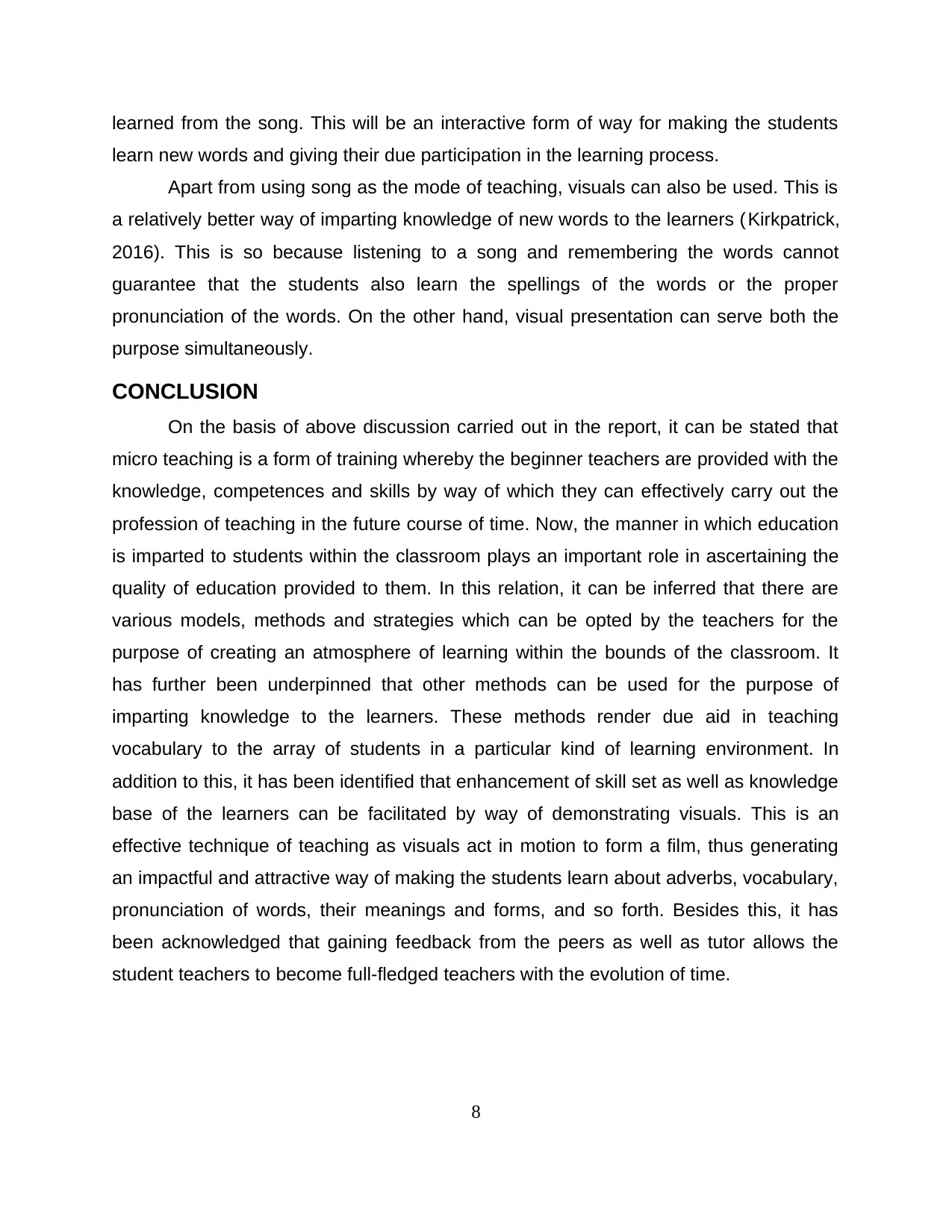
learned from the song. This will be an interactive form of way for making the students
learn new words and giving their due participation in the learning process.
Apart from using song as the mode of teaching, visuals can also be used. This is
a relatively better way of imparting knowledge of new words to the learners ( Kirkpatrick,
2016). This is so because listening to a song and remembering the words cannot
guarantee that the students also learn the spellings of the words or the proper
pronunciation of the words. On the other hand, visual presentation can serve both the
purpose simultaneously.
CONCLUSION
On the basis of above discussion carried out in the report, it can be stated that
micro teaching is a form of training whereby the beginner teachers are provided with the
knowledge, competences and skills by way of which they can effectively carry out the
profession of teaching in the future course of time. Now, the manner in which education
is imparted to students within the classroom plays an important role in ascertaining the
quality of education provided to them. In this relation, it can be inferred that there are
various models, methods and strategies which can be opted by the teachers for the
purpose of creating an atmosphere of learning within the bounds of the classroom. It
has further been underpinned that other methods can be used for the purpose of
imparting knowledge to the learners. These methods render due aid in teaching
vocabulary to the array of students in a particular kind of learning environment. In
addition to this, it has been identified that enhancement of skill set as well as knowledge
base of the learners can be facilitated by way of demonstrating visuals. This is an
effective technique of teaching as visuals act in motion to form a film, thus generating
an impactful and attractive way of making the students learn about adverbs, vocabulary,
pronunciation of words, their meanings and forms, and so forth. Besides this, it has
been acknowledged that gaining feedback from the peers as well as tutor allows the
student teachers to become full-fledged teachers with the evolution of time.
8
learn new words and giving their due participation in the learning process.
Apart from using song as the mode of teaching, visuals can also be used. This is
a relatively better way of imparting knowledge of new words to the learners ( Kirkpatrick,
2016). This is so because listening to a song and remembering the words cannot
guarantee that the students also learn the spellings of the words or the proper
pronunciation of the words. On the other hand, visual presentation can serve both the
purpose simultaneously.
CONCLUSION
On the basis of above discussion carried out in the report, it can be stated that
micro teaching is a form of training whereby the beginner teachers are provided with the
knowledge, competences and skills by way of which they can effectively carry out the
profession of teaching in the future course of time. Now, the manner in which education
is imparted to students within the classroom plays an important role in ascertaining the
quality of education provided to them. In this relation, it can be inferred that there are
various models, methods and strategies which can be opted by the teachers for the
purpose of creating an atmosphere of learning within the bounds of the classroom. It
has further been underpinned that other methods can be used for the purpose of
imparting knowledge to the learners. These methods render due aid in teaching
vocabulary to the array of students in a particular kind of learning environment. In
addition to this, it has been identified that enhancement of skill set as well as knowledge
base of the learners can be facilitated by way of demonstrating visuals. This is an
effective technique of teaching as visuals act in motion to form a film, thus generating
an impactful and attractive way of making the students learn about adverbs, vocabulary,
pronunciation of words, their meanings and forms, and so forth. Besides this, it has
been acknowledged that gaining feedback from the peers as well as tutor allows the
student teachers to become full-fledged teachers with the evolution of time.
8
⊘ This is a preview!⊘
Do you want full access?
Subscribe today to unlock all pages.

Trusted by 1+ million students worldwide
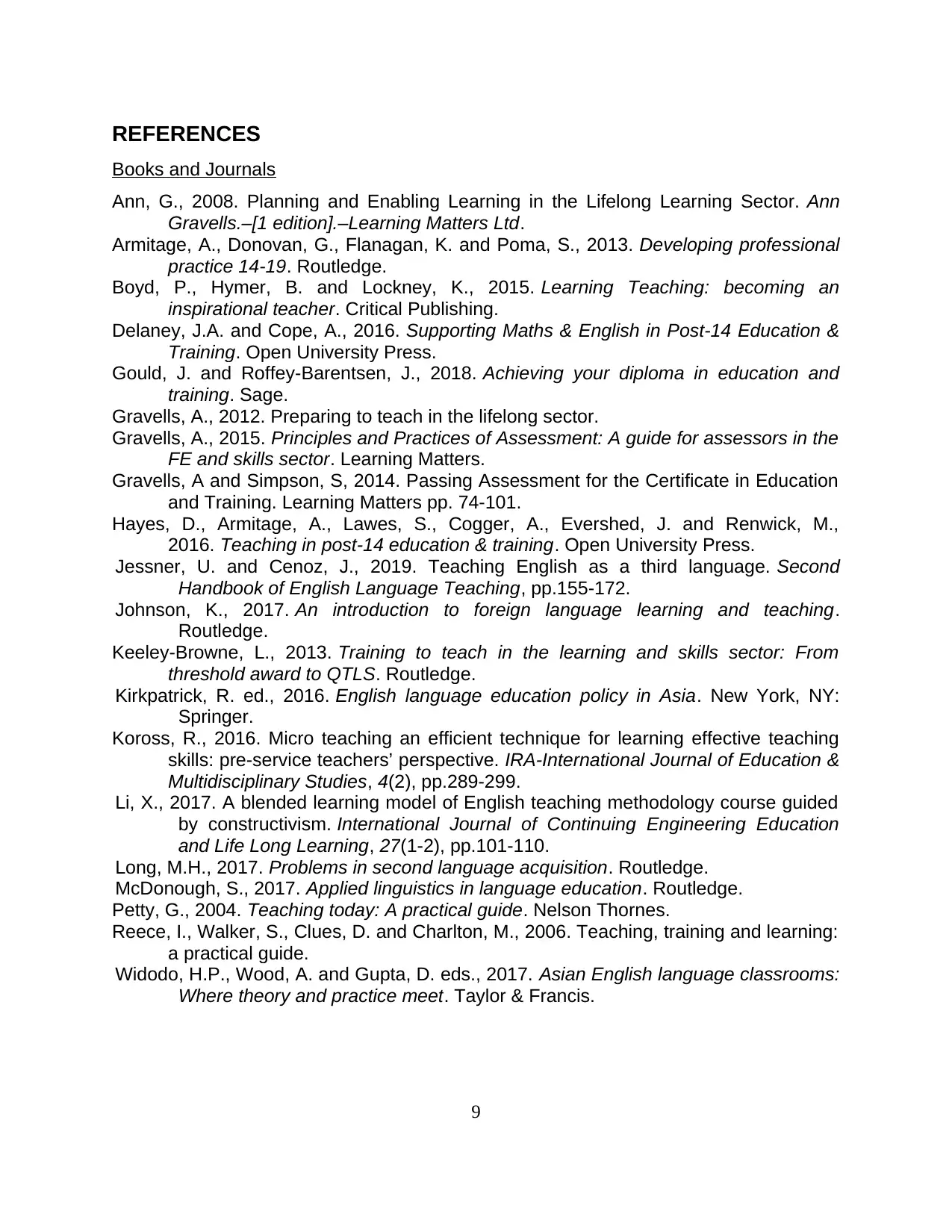
REFERENCES
Books and Journals
Ann, G., 2008. Planning and Enabling Learning in the Lifelong Learning Sector. Ann
Gravells.–[1 edition].–Learning Matters Ltd.
Armitage, A., Donovan, G., Flanagan, K. and Poma, S., 2013. Developing professional
practice 14-19. Routledge.
Boyd, P., Hymer, B. and Lockney, K., 2015. Learning Teaching: becoming an
inspirational teacher. Critical Publishing.
Delaney, J.A. and Cope, A., 2016. Supporting Maths & English in Post-14 Education &
Training. Open University Press.
Gould, J. and Roffey-Barentsen, J., 2018. Achieving your diploma in education and
training. Sage.
Gravells, A., 2012. Preparing to teach in the lifelong sector.
Gravells, A., 2015. Principles and Practices of Assessment: A guide for assessors in the
FE and skills sector. Learning Matters.
Gravells, A and Simpson, S, 2014. Passing Assessment for the Certificate in Education
and Training. Learning Matters pp. 74-101.
Hayes, D., Armitage, A., Lawes, S., Cogger, A., Evershed, J. and Renwick, M.,
2016. Teaching in post-14 education & training. Open University Press.
Jessner, U. and Cenoz, J., 2019. Teaching English as a third language. Second
Handbook of English Language Teaching, pp.155-172.
Johnson, K., 2017. An introduction to foreign language learning and teaching.
Routledge.
Keeley-Browne, L., 2013. Training to teach in the learning and skills sector: From
threshold award to QTLS. Routledge.
Kirkpatrick, R. ed., 2016. English language education policy in Asia. New York, NY:
Springer.
Koross, R., 2016. Micro teaching an efficient technique for learning effective teaching
skills: pre-service teachers’ perspective. IRA-International Journal of Education &
Multidisciplinary Studies, 4(2), pp.289-299.
Li, X., 2017. A blended learning model of English teaching methodology course guided
by constructivism. International Journal of Continuing Engineering Education
and Life Long Learning, 27(1-2), pp.101-110.
Long, M.H., 2017. Problems in second language acquisition. Routledge.
McDonough, S., 2017. Applied linguistics in language education. Routledge.
Petty, G., 2004. Teaching today: A practical guide. Nelson Thornes.
Reece, I., Walker, S., Clues, D. and Charlton, M., 2006. Teaching, training and learning:
a practical guide.
Widodo, H.P., Wood, A. and Gupta, D. eds., 2017. Asian English language classrooms:
Where theory and practice meet. Taylor & Francis.
9
Books and Journals
Ann, G., 2008. Planning and Enabling Learning in the Lifelong Learning Sector. Ann
Gravells.–[1 edition].–Learning Matters Ltd.
Armitage, A., Donovan, G., Flanagan, K. and Poma, S., 2013. Developing professional
practice 14-19. Routledge.
Boyd, P., Hymer, B. and Lockney, K., 2015. Learning Teaching: becoming an
inspirational teacher. Critical Publishing.
Delaney, J.A. and Cope, A., 2016. Supporting Maths & English in Post-14 Education &
Training. Open University Press.
Gould, J. and Roffey-Barentsen, J., 2018. Achieving your diploma in education and
training. Sage.
Gravells, A., 2012. Preparing to teach in the lifelong sector.
Gravells, A., 2015. Principles and Practices of Assessment: A guide for assessors in the
FE and skills sector. Learning Matters.
Gravells, A and Simpson, S, 2014. Passing Assessment for the Certificate in Education
and Training. Learning Matters pp. 74-101.
Hayes, D., Armitage, A., Lawes, S., Cogger, A., Evershed, J. and Renwick, M.,
2016. Teaching in post-14 education & training. Open University Press.
Jessner, U. and Cenoz, J., 2019. Teaching English as a third language. Second
Handbook of English Language Teaching, pp.155-172.
Johnson, K., 2017. An introduction to foreign language learning and teaching.
Routledge.
Keeley-Browne, L., 2013. Training to teach in the learning and skills sector: From
threshold award to QTLS. Routledge.
Kirkpatrick, R. ed., 2016. English language education policy in Asia. New York, NY:
Springer.
Koross, R., 2016. Micro teaching an efficient technique for learning effective teaching
skills: pre-service teachers’ perspective. IRA-International Journal of Education &
Multidisciplinary Studies, 4(2), pp.289-299.
Li, X., 2017. A blended learning model of English teaching methodology course guided
by constructivism. International Journal of Continuing Engineering Education
and Life Long Learning, 27(1-2), pp.101-110.
Long, M.H., 2017. Problems in second language acquisition. Routledge.
McDonough, S., 2017. Applied linguistics in language education. Routledge.
Petty, G., 2004. Teaching today: A practical guide. Nelson Thornes.
Reece, I., Walker, S., Clues, D. and Charlton, M., 2006. Teaching, training and learning:
a practical guide.
Widodo, H.P., Wood, A. and Gupta, D. eds., 2017. Asian English language classrooms:
Where theory and practice meet. Taylor & Francis.
9
1 out of 10
Related Documents
Your All-in-One AI-Powered Toolkit for Academic Success.
+13062052269
info@desklib.com
Available 24*7 on WhatsApp / Email
![[object Object]](/_next/static/media/star-bottom.7253800d.svg)
Unlock your academic potential
Copyright © 2020–2026 A2Z Services. All Rights Reserved. Developed and managed by ZUCOL.





